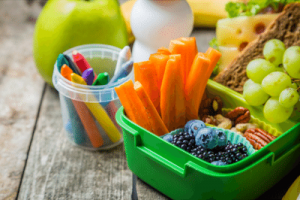It’s nearly time for our kids to head back to school and daycare, if they haven’t already. That means it’s also nearly time for parents to enter into that vicious cycle of the seemingly never-ending colds, flus, and runny noses. This begs the question of what a parent can do to boost immunity and prevent their kids from getting sick, especially when kids tend to get sick about 6-8x in a school year.
Our immune systems are made up of 2 types of immunity: innate and adaptive. The innate immune system is important for quickly recognizing and fighting potential threats. The adaptive immune system is important for learning more about what the body is fighting and developing a bigger and more robust response the next time it faces the threat. Since kids have more inexperienced immune systems, they may tend toward getting sick more often. Exposure to these bugs is important for building that adaptive immune system and making them more resilient the next time. However, there are things a parent can do to prevent the rounds of ongoing illness, as well as make illness more comfortable for their child.

Back to Basics
- Eating a balanced diet – Everyone knows that fruits and vegetables are filled with immune supporting properties, but it’s not always easy to get these into kids. These tips will help them get the fibre, micronutrients, and antioxidants that they need to stay healthy.
Sneaky tips:
-
- Engage your kids in choosing their favourite fruits and veggies to build a “rainbow”
- Get them involved in meal prep.
- Dial back on the sugars and processed foods.
2. Sleep schedules – Getting into a bedtime and wake routine that stays consistent throughout the week (yes, even weekends!) is another important tip to optimize health (1). Kids (and their growing adrenal glands) thrive on routine and knowing what to expect. Sleep also regulates leptin levels, cortisol levels (high amounts can impair the immune system) and inflammation.
3. Stress management – Stress can inhibit optimal immune function so finding ways that your child can cope better with stressors can be a game-changer. Exercise, yoga classes, or meditation are great ways to modulate the nervous system. Building these activities into a dedicated family time can also further support this.
Herbs and Supplements
- Probiotics – 70% of our immune system resides in the gut so we want to make sure that we’re supporting our good gut bacteria (2)! A study on preschoolers found that a daily multi-strain probiotic reduced the incidence of colds and flu by as much as 31.8% and reduced the duration of the illness if they did get sick (3). Lactobacillus acidophilus and Bifidobacterium lactis are two strains that can be helpful for preventing cold and flu, as well as reducing the duration and severity of symptoms.
- Zinc – Zinc deficiency is not the most common in developed countries, however supplementing with zinc preventatively during the months with the highest prevalence of viral infection may help prevent frequency and severity of infection. However, zinc should not be supplemented long-term without consulting your primary care practitioner (4).
- Vitamin D – Fall and winter (especially in Canada) often mean more time spent indoors and less time exposed to the sun. This “sunshine vitamin” is critical to activating our immune defences and contributing to resilience with fighting infection.
- Andrographis and Siberian Ginseng – These herbs have been been used to effectively treat upper respiratory tract infections. Studies have found it to be more effective than Echinacea for reducing symptoms of the common cold when used in combination with Siberian Ginseng (5). A study also found that andrographis reduced the risk of illness from a winter cold by 33% among a group of students (6).
- Elderberry syrup – Has been shown to be effective against respiratory pathogens like influenza and has shown good efficacy in reducing intensity and duration of symptoms of the common cold – this is a great option for kids because it is pleasant tasting and kids love it!
- Echinacea – This has been used traditionally at the first onset of infection. A randomized, controlled, and blinded study on 203 children aged four to twelve, researchers found that a daily 400 mg dose of Echinaforce was comparatively associated with less serious cold and flu symptoms, 63.9% less complicated infections, and an astounding 72.6% reduction in necessary antibiotic treatments (7).

To learn more about ways to optimize nutrition, improve sleep, manage stress, and find safe combination products that can build immune resilience in your children (and taste great), you can book a consult with a Naturopathic Doctor that has a focus in pediatric health.
DISCLAIMER: This does not constitute a therapeutic relationship and this is not medical advice. Please consult with your primary care practitioner before adding new therapies into yours or your child’s regimen.
 Dr. Andrea Picardo is a Naturopathic Doctor working at The WOMB in Milton. She is passionate about enabling others to reach their full potential and guiding them on their personal health journey. She believes in equipping her patients with the information they need, while empowering them to make informed decisions about their health. She is ready to support her patients every step of the way, assist them with any barriers to health they may have and help them meet their goals and feel heard. Her practice focuses include reproductive and hormonal health, pregnancy support as a birth doula, and pediatric care.
Dr. Andrea Picardo is a Naturopathic Doctor working at The WOMB in Milton. She is passionate about enabling others to reach their full potential and guiding them on their personal health journey. She believes in equipping her patients with the information they need, while empowering them to make informed decisions about their health. She is ready to support her patients every step of the way, assist them with any barriers to health they may have and help them meet their goals and feel heard. Her practice focuses include reproductive and hormonal health, pregnancy support as a birth doula, and pediatric care.
References:
- Irwin Sleep and inflammation: partners in sickness and in health. Nat Rev Immunol 19, 702–715 (2019).
- Vighi G, Marcucci F, Sensi L, Di Cara G, Frati F. Allergy and the gastrointestinal system. Clin Exp Immunol. 2008 Sep;153 Suppl 1(Suppl 1):3-6. doi: 10.1111/j.1365-2249.2008.03713.x. PMID: 18721321; PMCID: PMC2515351.
- Leyer GJ, Li S, Mubasher ME, Reifer C, Ouwehand AC. Probiotic effects on cold and influenza-like symptom incidence and duration in children. Pediatrics. 2009 Aug;124(2):e172-9. doi: 10.1542/peds.2008-2666. Epub 2009 Jul 27. PMID: 19651563.
- Shah UH, Abu-Shaheen AK, Malik MA, Alam S, Riaz M, Al-Tannir M. The efficacy of zinc supplementation in young children with acute lower respiratory inections: A randomized double-blind controlled trial. Clin Nutr. 2013;32(2):193-199.
- Spasov AA, Ostrovskij OV, Chernikov MV, Wikman G. Comparative controlled study of Andrographis paniculata fixed combination, Kan Jang and an Echinacea preparation as adjuvant, in the treatment of uncomplicated respiratory disease in children. Phytother Res 2004;18:47-53
- Zhai Z, Liu Y, Wu L, Senchina DS, Wurtele ES, Murphy PA, Kohut ML, Cunnick JE. Enhancement of innate and adaptive immune functions by multiple Echinacea species. J Med Food. 2007 Sep;10(3):423-34. doi: 10.1089/jmf.2006.257. PMID: 17887935; PMCID: PMC2362099.
- Ogal M, Johnston SL, Klein P, Schoop R. Echinacea reduces antibiotic usage in children through respiratory tract infection prevention: a randomized, blinded, controlled clinical trial. Eur J Med Res. 2021 Apr 8;26(1):33.





